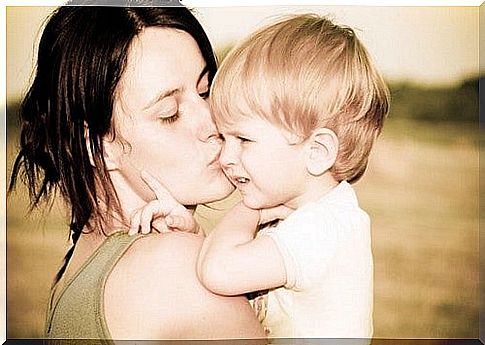Kiss: Children Have The Right To Say No If They Do Not Want To

Children learn to respect and set boundaries as they grow. This includes emotional boundaries. It is important for children to learn that they have the right to say no to kisses if they do not feel like it.
In many cultures, a kiss on the cheek is a way to greet. Some parents therefore force their children to socialize under this rule.
For toddlers, kissing is associated with love. They learn to kiss their parents as a spontaneous act of love. This is the complete opposite for a stranger.
Before you force a child to give a stranger a kiss – or even a relative – it is wise to ask if he feels comfortable doing this.
Adults choose whether to greet with a kiss or a handshake. The same should apply to children.
Parents mistakenly believe that their children are rude if they refuse to give a kiss. But there are other ways to show manners, even for toddlers.
A handshake or a pat on the back is also an accepted form of greeting.

Refusing to kiss is more than attitude
It is recommended that all parents talk to their children about love and manners.
Love should be given as a spontaneous response to a feeling of love where manners show respect for other people.
Although a child should treat adults with respect, he is not obligated to be loving if he does not feel like it.
Manners and love should not necessarily exist in equal parts. Minors should not be forced to give kisses or hugs without their consent. This can be the way they set boundaries for strangers.
Some specialists agree that the obligation to give kisses can make children vulnerable.
Most people adopt a complacent attitude towards love and manners. This attitude exposes the child to potential abuse or harassment.
In general, child abuse occurs with people who are close to the child. This may be a consequence of the minor’s complacency because he is “loving.” Since they are forced to give love, they cannot say no to physical contact.

Kisses and obedience
Commitment is also associated with the term ‘obedience’. In society, the concept of obedience is related to the child, who does what his parents ask him to do, whether it is right or wrong.
Again, this situation brings the child into a state of obedience and vulnerability. Before they learn to be obedient, children need to learn to have their own standards, and learn to be selective.
Why should a child’s decision not to kiss be respected?
First , the child learns that he owns his own body. He will be able to decide when to establish physical contact and with whom, while learning to distinguish between love and respect.
The decisions that the child makes about his own body will make him less vulnerable to harassment.
This also applies to situations of bullying. Self-satisfaction can lead to the child accepting ridicule for fitting into social groups.
It gives children greater self-confidence when we teach them to make their own decisions.
A child who develops his own standards becomes more confident as an adult. The role of parents is to accompany them during this process.

Likewise , the child learns to respect a person’s place. Not all adults respond in the same way as a child. Some feel intimidated by the presence of children.
Do not force children to give strangers a kiss. This can free them from unpleasant situations, such as rejection.
Confusion is another factor to consider. Younger children are more impulsive, which can cause them to give kisses to everyone. In this way, they are more prone to abuse or rejection.
Finally, it can also be a health problem. It can expose them to viral infections or contact diseases if we force children to give kisses.







